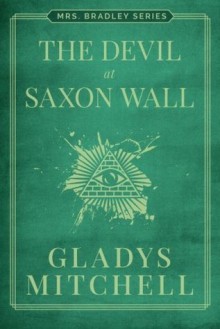
This was my second Mrs. Bradley mystery, after The Saltmarsh Mystery, and I think that I can say at this point that Mrs. Bradley is quite unlike any of the other golden age mystery series that I’ve read so far. The book begins with a long preliminary tale about the ill-fated Constance who marries the enigmatic, possibly psychotic, Hanley Middleton.
The first section of the book is identified as “First Manifestation: Domestic Interior,” which describes the abusive marriage of Constance and Hanley, and the ultimate death of Constance in child birth after she returns to her home in Saxon Wall, having previously fled back to her parents. Hanley follows Constance in death a short time later.
The second section of the book is titled “Second Manifestation: Conversation Piece“. I have no idea why it’s called this, actually, because there is precious little intelligent conversation in this book, and a whole lot of garbled confusion. At the beginning of the section, we are introduced to the main character of the book, one Hannibal Jones, described thus:
Hannibal Jones had earned a dishonest livelihood for seventeen years by writing sentimental novels. It was the less excusable in Jones to get his living this way in that he knew—none better, since he had lectured in Abnormal Psychology for a year or two in an American university before taking up his rather more nefarious career as author—that such novels as he wrote tended to encourage morbid daydreaming on the part of their readers, and that cooks and dressmakers, mothers of families, spinsters in all walks of life—even his own female relatives—were developing, because of him and his works, a Cinderella-complex of the most devitalising, time-consuming type.
Hannibal, who is quite rich as a result of his success as a writer, has some sort of a nervous breakdown when he accepts a large publishers advance for a book he doesn’t really want to write. He consults Mrs. Bradley, and she gives him advice to “get out your third-best car and travel until you find a sufficiently interesting and secluded village. Make yourself part of it. Study the people, but resolve never to write about them in a novel. Love them. Quarrel with them. Begin a lawsuit. Play village cricket.”
Somehow, he has the misfortune to end up in Saxon Wall, which must be the most terrible place in all of England, full of villagers who are downright creepy, baby-switchers, a psychotic vicar, and a drought which means that they are all, apparently, going to die of dehydration. Jones realizes that he is in the middle of some kind of devilish psychodrama and invites Mrs. Bradley in to help him solve the crimes, of which there are many.
The plot of this book made almost no sense. It was so convoluted that I couldn’t follow the thread at all, much less unravel it. Saxon Wall is a singularly horrible place, and the denizens of Saxon Wall are singularly horrible people. There wasn’t a single non-horrible person living there. Jones himself was confounding – why he didn’t just get in his car and drive the hell out of that place I cannot begin to imagine. Mitchell brings in witchcraft, folklore, and beer to add to the altogether strange tale. Mrs. Bradley shows up at about the 50% mark to untangle the skeins of the mystery, but even at the end I was left somewhat puzzled by everyone’s behavior.
“The temperament,” repeated Mrs. Bradley. “Yes, child. As good psychologists, we ought not to lose sight of that important item. The temperament for murder—an inexhaustibly interesting subject. I have it, you have it, the vicar has it. Mrs. Tebbutt has it, Doctor Mortmain has it. To how many other people in Saxon Wall would you say it has been vouchsafed?”
Everyone, dear reader. Everyone.
The third section contains some brief End Notes, which try to explain the book. They clear up a few things. But only a few things.
One of the most curious and interesting features of the general mentality, if such a term is permissible, of the inhabitants of Saxon Wall, was a noticeable inability to distinguish between essential good and essential evil.
I can’t say that I really enjoyed this book, but it did keep me interested, even if it was totally bananas.

 Log in with Facebook
Log in with Facebook 















